Houshin’s shoulders sagged with resignation. Though he clearly dreaded the thought, he climbed from the bath and turned to Kazuchiyo on his knees, lowering his forehead to the wet stone. “I will,” he promised, and Kazuchiyo believed him.
He hurried upright as Mahiro returned, excusing himself. Mahiro threw suspicious glares at his back as she slipped into the water. “What did he want?”
“He wanted to reminisce,” Kazuchiyo said, and he waved for his portion of the saké with uncharacteristic eagerness. “I knew him, in my former life.”
Mahiro poured Kazuchiyo a cup and watched closely as he gulped it down. It wasn’t characteristic of her to be quiet, either, but an awkward silence stretched between them for some time before she furrowed her brow and said, “Hey, Kazu. You like me, don’t you?”
Distracted as he was by Houshin’s provocative declarations, Kazuchiyo could only answer, “Of course. You’re my sister.”
Mahiro’s face scrunched up, and she took a swig of alcohol from the bottle. “Do you like me because I’m your sister?” she persisted. “Or in spite of it?”
“Does it matter?” Kazuchiyo asked, but upon seeing her crestfallen, a pang of guilt forced him to take her seriously. “I don’t resent you for anything, if that’s what you’re asking.”
Mahiro relaxed, though she still looked troubled. “Good,” she said, and then changed the subject to how skinny and drooping she would look if she only ever ate roots and shrubbery like Houshin, and how she was looking forward to a feast at Ninari. Certainly the border samurai would feed them pork and venison poached from Kibaku woods.
The sky was near black by the time the pair returned to the guest house to sleep, no moon and few stars to light their way down the path. As they parted, Mahiro looked to her brother once more with a pitiable expression, but still worked up a cheerful good night without trying to engage him in sincerity again. For that, he was grateful.
In his room, Kazuchiyo let his hair down and huddled under his bedding. They had not yet even reached Ninari and he was already simmering with concerns and secrets he had never expected. He thought of the Tatsutomi’s grand keep where the Red Dragon and his generals used to gather when he was young, their eyes and hearts ever seeking war. At the time he had never considered a battle greater or an enemy more imposing than their northern rivals, and the competition that had captivated his family for generations. Now, the truth was set loose upon him: Yatamoto and the Waseba brothers, greedy for a greater war, had judged his father lacking ambition and destroyed him for it. With fresh insight Lord Aritaka’s haste to make war on Kibaku made complete sense, and even lent gravity to the petty conflicts between O-ran and Satsumi, Hidemune and Kazuchiyo himself. It was not merely Gyoe that hung in the balance.
A thousand ages of peace, his father had named him. An expression of hope and cowardice his bannermen had killed him for, and one that Lord Aritaka was determined to stamp out of his stolen son. Kazuchiyo curled his knees to his chest and shuddered with frustration that burned his lungs. And he lay there, hoping for sleep, until he heard a creak on the wood floor just beyond his doorway.
Kazuchiyo went very still. The night was so dark and windless that he hadn’t noticed before, but with his senses intensely focused he realized that the quiet chirp of the crickets was a little bit louder. He held his breath and knew, with frightful certainty, that he was not alone in the room. With movements slow and subtle enough to keep the bedding from rustling, he reached into the waistband of his robe where his tanto was hidden. His palm sweat around the grip and he was convinced he could feel his own name branding itself into his palm.
He waited there for minutes that dragged on for hours, but nothing stirred, and he heard and sensed no more indication of an intruder. When at last he turned, the sliding door to the outside was open a mere two inches, and in the very dim light he could just barely make out the shape of a folded paper leaning in the gap.
Kazuchiyo shot forward and snatched it up. He stumbled over his robe as he threw the door open, but he could make out no figure retreating from the grounds, no disruption in the line of ferns or low-hanging branches. The night air cooled the sweat on his neck, and with a shiver he ducked back into the room, making sure the doors were closed and that he had not roused anyone else in the building. Thus assured, he lit a candle and crowded over the tiny flame to read.
It was not the same poem that he and Amai had shared over the past three weeks of secret correspondence. The paper was rough and torn, as if having been ripped from a note or a ledger, and the words were scrawled in great haste. But it was unmistakably familiar penmanship, and it read:
Helm and bow laid down for a
new hunt no less passionate
Kazuchiyo read the lines over several times, until the distant call of an owl startled him into blowing out the candle. He folded the paper as small and thin as he could and tucked it into Iomori’s ribbon for safekeeping before hurrying back into bed. Fourteen syllables and all his earlier worries scattered like petals in the wind. Huddled beneath his robes he imagined a young shinobi trailing their caravan through the woods, ever out of sight as true to his title, ever focused. He marveled at Amai’s careful wording—calling back to the first verse, completing the narrative so efficiently. That attention to detail had to have been for his own sake, and that in itself excited him as much as the accepted invitation.
Surely Amai was following them to Ninari Castle. There Kazuchiyo would have a proper chamber of his own, perhaps even with an outside window just like at Gyoe, where a clever fox could sneak in undetected to all but his rival, waiting, willing….
If not for the wine Kazuchiyo might have never found sleep that evening, and even then memories of the rainy field threatened to cloud his mind as he drifted off. His dreams were electric and full of running, and he woke up more eager than ever to be underway.
Thankfully, come morning Lord Aritaka was no less impatient. Breakfast was served, and soon afterward the camps were broken down and preparations made to depart. Houshin was there to see them off, and though his elder brother did not make an effort to share any parting words, Kazuchiyo did thank him for having hosted them for the night. Houshin bowed his head.
“I am yours to call upon, whenever you have need of me,” he said, and Kazuchiyo bowed in return.
Then they were on their way again, along the twisting road to the west. The trees were denser than the day before, allowing only sparse sunlight to warm his back. He tried to devote his concentration to the path and topography, only to find that his mind was too full of anxious anticipation for him to focus. He looked continuously to the trees hoping to see a shadowy figure giving chase. Then he looked ahead, imagining a taller, broader figure he knew to be waiting, and his heart tangled.
By midday they came to a rise in the hills, the forest peeling back to reveal an uninterrupted view of the countryside. Kazuchiyo gazed out over the slopes, trees, and fields beyond, in those moments feeling peace. How could he think of war or even human pleasures when faced with flowing green in infinite shades, winding paths with peaceful travelers, the outlines of fields in the distance preparing for spring planting. He found his gaze drawn to the south, and the shape of a village among the trees where the citizens were likely finishing their morning chores. He wondered if any of their youths were being offered up to Lord Aritaka’s war plans.
“That village is called Terado,” said Lord Aritaka, and Kazuchiyo startled to find that he had slowed his horse to ride beside him. “Past the forest and hills beyond it is the Shimegahara plains. Is that what you wish to see?”
“I was wondering how many soldiers it was home to,” Kazuchiyo corrected him humbly. He turned his gaze forward again. “Are they hearty folk? Can they be depended on?”
Aritaka nodded with approval. “I can think of at least one plenty hearty,” he said, and Kazuchiyo sat taller in his saddle. When he looked ahead, he could see the outline of Ninari’s dark roof in the distance, nestled among tall pines. The rest of that day’s journey continued with a sense of constrained urgency, and by the time they reached the gate, Kazuchiyo was sure he could have flown straight over it.
Though Castle Ninari was not as expansive as Gyoe, it was no less impressive. The main keep stood four stories tall atop a twenty foot base of stone, its eaves jagged and striking, confusing to the eye. It was accompanied by a single lower tower that was nearly as tall and just as sturdy. But the real defenses were in the walls: an immense bailey with smooth walls and stone base surrounded the entire structure, with long overhangs to prevent breachers, and diamond cutouts up and down its length for archers. The closest pines had been hacked down for a long range of visibility for defenders. Kazuchiyo did not envy any advancing army that chose to lay siege to such a well constructed fortress.
The gates opened for them, and as Lord Aritaka lead the way through, they were greeted by rows of samurai and their underlings. Many of the subordinates were dressed for labor rather than presentation, as if having been dragged from their posts, and a keen eye would have noticed that a few of the scaffolds leaning against the inner wall were not quite complete. But Generals Utsukawa and Ebara were at the height of their manners, each bowing deeply at the waist as they accepted their lord.
“Allow us to lead you to the interior,” said General Utsukawa.
They guided the procession on foot along the inner wall, toward a second gate that would lead them into the compound’s interior proper. Along the way Kazuchiyo looked to the workers come down from their scaffolds, his eyes darting from one to the next. Just before reaching the gate his gaze finally found its prey: a tousled mop of brown hair, and broad shoulders tanned from the sun and glistening with sweat, just like his every imagining. His heart pounded so thunderously he was sure the man heard it—Yagi lifted his head from his bow, and for the first time in five years, they faced each other.
At first, Yagi’s dark eyes were just as Kazuchiyo remembered: fierce and contemptuous, as if he could have sprung to violence at any moment against a despised enemy. But then his brow arched in surprise and recognition, and the flutter of his eyelashes sent goose bumps rippling up Kazuchiyo’s skin. Did his appearance warrant such a stunned reaction?
Too soon they rounded the second gate, and the contact was severed. Kazuchiyo took a deep breath and assured himself that now that he had arrived, he would have many chances to properly greet him, as soon as the pleasantries were over with.
They dismounted just outside the keep, and as servants came to tend the horses, Lord Aritaka, his children, and generals were led on a tour of the grounds. “I noticed the construction was not quite as compete as your letter led me to believe,” Aritaka was quick to scold General Utsukawa. “Your men are still hard at work.”
“It is only the stairs and rails for the archers,” Utsukawa quickly assured him. “We still don’t have a complete count of how many soldiers we’ll have to man the walls.”
“As many as they will hold, General. We have the men.”
“Those Kibaku crows will have to be idiots to throw themselves at a castle like this,” said Mahiro cheerily as she surveyed the armaments with approval. “Are you sure you’ll be able to seduce them into it, Father?”
Aritaka frowned at her choice of words. “The Koedzuka samurai are a greedy lot. They won’t be able to resist.”
His assessment did not match the stories Kazuchiyo had heard from Master Iomori over the years, but he paid little mind. Though he stayed close to his father’s side throughout the tour of the castle, he did not devote an appropriate amount of attention until reaching his chamber in the upper floor of the main keep.
“This room will serve you while you are here,” said Utsukawa as he introduced Kazuchiyo to the modest space. “I hope it does not displease you.”
Kazuchiyo noted the room’s broad window with slats that could be deployed or pushed aside as needed. “It suits me very well,” he said.
The tour continued, and once completed, Utsukawa bowed again to his lord and guests. “Supper will be prepared shortly. Your rooms should be well stocked, if you would like to change clothing before the meal.”
Kazuchiyo glanced between the two generals and could not stop himself. “Will your sons be joining us?” he asked.
“Yes,” Utsukawa replied while Ebara pulled a face. “They are very eager to meet you, Lord Kazumune.”
“Mine is not well suited to ceremony,” said Ebara with a hint of a wince. “But he will be present, yes.”
“I look forward to it,” said Kazuchiyo, and he excused himself back to his room to prepare.
As promised, the room was already well stocked, and Kazuchiyo dressed in a handsome, indigo hitatare robe well tailored to his size. He would have liked a bath, but had to make do with a wash basin for his face. His long hair he spent the most time on, brushing and tying to perfection. By the time he was finished he was all but giddy, thinking of the many stories he had to share, the stories he hoped to hear. It did not occur to him that Yagi might have felt any differently. To him, this was a destined reunion, one that could forever change his fate. And as naive as it may seem, in this he was not mistaken.
Kazuchiyo was finishing his preparations when a slip of his sleeve reminded him of the ribbon tied around his wrist, and the folded note that had remained tucked inside it throughout the day. With a pang he drew it toward him, thinking then how fickle and greedy he was. What would either man say if they could see him drawn so powerfully in two directions? But what else could he have done, given his circumstances?
Kazuchiyo moved to the window, propping it open just half a hand’s width before darting out of the room to head to supper.

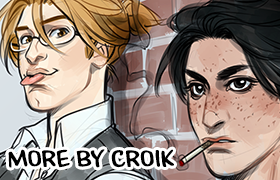
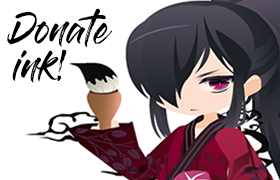
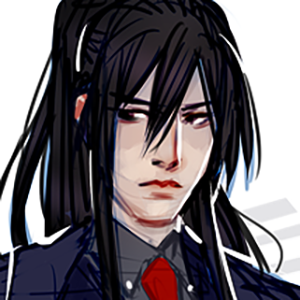








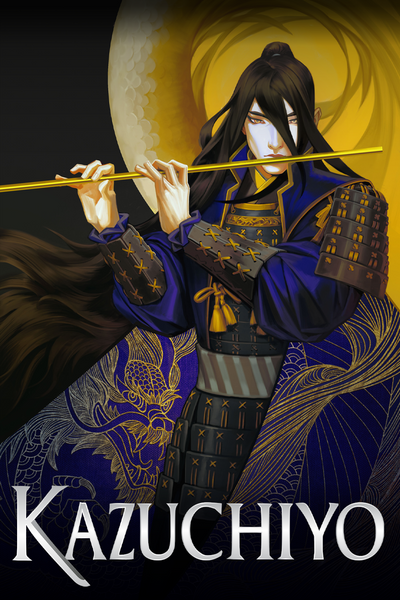
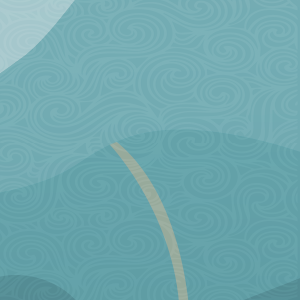
Comments (6)
See all